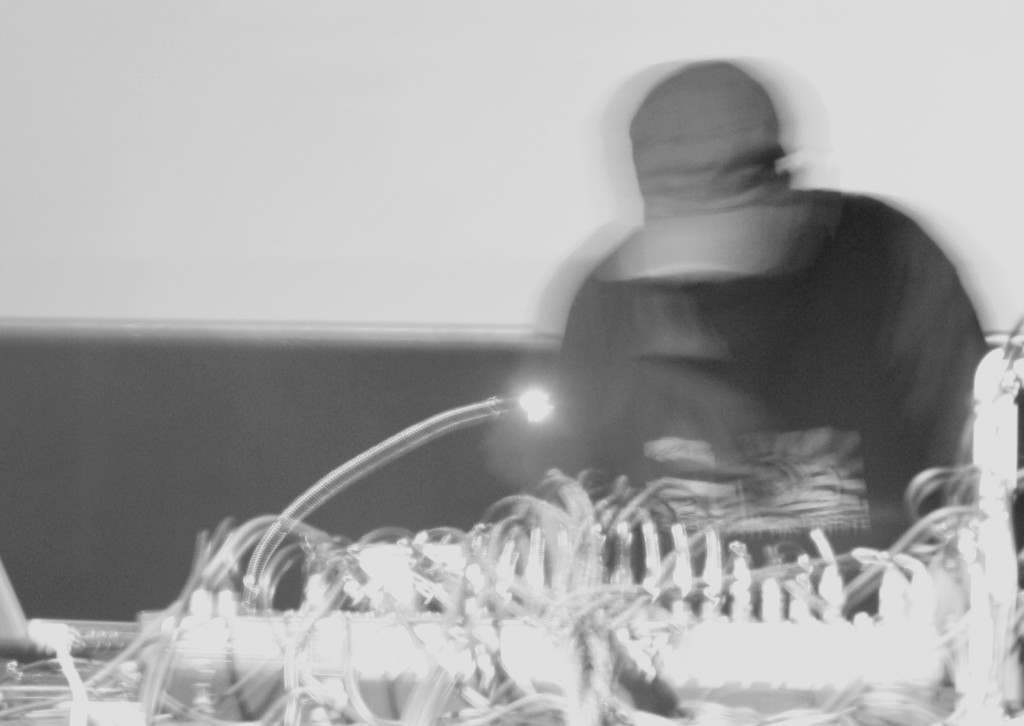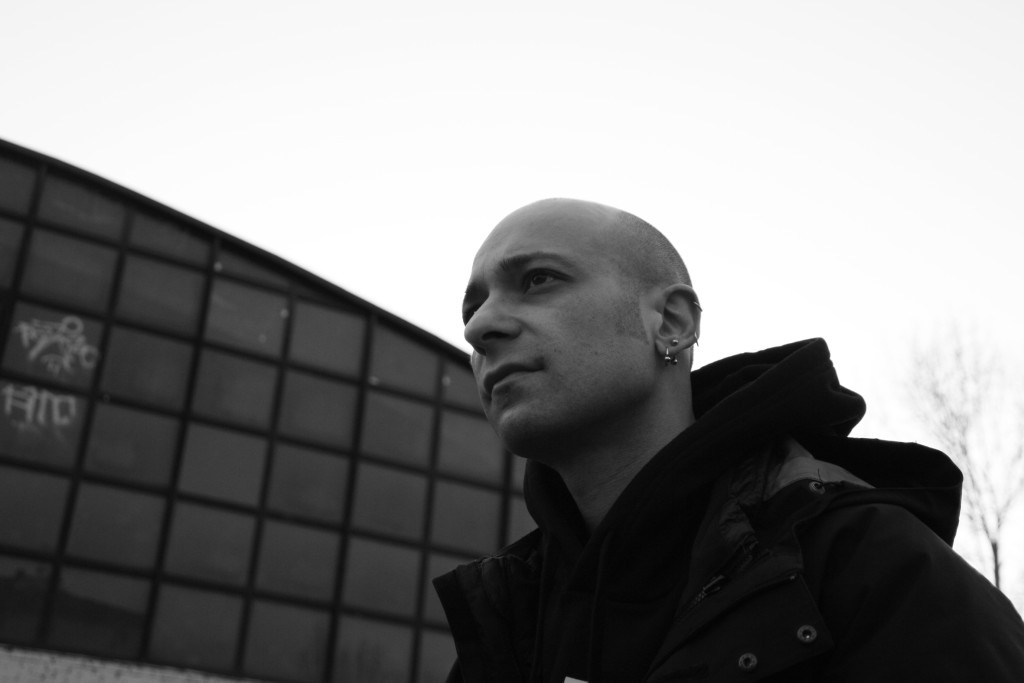Published by Alessandro Violante on September 2, 2018
Fabrizio Matrone, An Italian at the court of German label Ant-Zen, the rhythmic noise stronghold of Stefan Alt. Primitive Forms, a return to the original forms. A return to the simplicity of rhythm. Addictive electronic music. A repetition of long electronic mantras. Sound research. These things are the last incarnation of Fabrizio Matrone for Ant-Zen. Let’s hear from the musician himself.
Hi Fabrizio! I didn’t know about your music, then I read a newsletter of Ant-Zen and I told myself: I have to contact him! I can’t hide the fact I was very happy to hear that an Italian project has finally landed on the Stefan Halt’s label. How did you get in contact with it?
Ant-Zen has always been a topic label for a certain kind of music, I found about it by chance while listening to Sable by Celluloid Mata in 2000. I really liked that album, and so I started listening to the other releases by the label. A world made of music and images was shown to me, I still remember the afternoons spent connecting via modem, looking at Ant-Zen’s website and letting myself being taken by Stefan Alt photos, which I find beautiful, very elegant and with a strong impact. Some years later (at the time the project Matter included Fabio FkDrone) after I had sent some demos around, we managed to get in contact with the label of Marcel “100 Blumen” called Le Petit Machiniste, with which we released some cd-rs. I remember we had sent some demos to Ant-Zen during the following years, but probably we never managed to totally convince them. Then I found myself as the sole actor in Matter, and there were three releases with Kvitnu which started a big change. Thanks to an advice by Rich Oddie (Orphx) I decided to send some tracks to Stefan this year. Surprisingly, and with a great joy for me, he liked my tracks and they became the core around which the album has been developed.
Your music path is very various. You worked as Matter on many albums, very different one from the other, for labels like Le Petit Machiniste and Kvitnu, and there are the woks as Heidseck and Fm Chloroform, too. Let’s talk about your sonic universe and these projects of yours.
My music reflects everyday life, what I live and feel firsthand, my dreams, my aims, my delusions and hopes. Rage, joy, and defeat. Passion, love, ecstasy, my fantasies and my nightmares. The dizziness of ascending, the apnea of diving, meditative introspection and explosive power.
Fmchloroform is the moniker used by me to realize my first vaguely ambient and industrial outputs. In a nutshell, a version of Heidseck with rawer, and sometime naiver, productions. By time I redefined my sound and thanks to my grown technical skills I managed to explore soundscapes closer to my idea of sound. This led me to produce more material under the Heidseck moniker. A dark and enveloping sound, closer to a certain kind of isolationist ambient music [if we want to find a definition for it], a very intimate and immersive experience.
Let’s focus on Primitive Forms. From what I read, it was very well received even by Italian fans. Would you like to tell us more?
When I composed the first tracks, which were going to be the core around which the first album was developed, I had no idea about what was going to be the final result or the direction of the work. This happens to me almost every time, I seldom have a clear vision of an album, if not only after I had composed a fair amount of tracks. I like to lose myself in sound and I like to be guided by tracks as they come to life. It’s a kind of psycho-geography applied to sound, to lose yourself in the streets left to chance, and to find yourself in unexpected beautiful, or disturbing, places. The element of surprise inherent to this situation is something not programmed. Compared to my two last albums, Primitive forms is faster for sure, we rarely go below 100 bpm and, excluding two tracks, rhythm is every where and the work is very oriented toward a certain kind of techno. Almost a return to the origin, to the first productions.
I would define electronic music as “addictive”. Almost every track is very long and starts with a rhythmic pattern. Progressively, sound and rhythm layers, and effects as well, are added. I think a never boring repetition is one of the key concepts of your album. It puts the listener into a catatonic state.
I love a repetitive beat in which changes are minimal and subtle. I like when sounds are repeated and they slowly mutate in a track, forming step by step as the track evolves, and when you find out something has changed only at the end of the listening experience, maybe by delivering chaos or the minimalistic tranquility of a drone string, for example. A kind of tribal music ending in trance. I like to layer the sound so that more levels of listening-interpretation for the track are possible, and to hold the listener’s attention by small details.
The titles for your tracks are very interesting. Fossile, range, tassonomia, gerarchia, ambiente, estinzione, traccia, and so on. What’s the link? Why did you chose them? I really find it an interesting argument to explore.
The link between the titles is the fact they are all referred to fossils and to their classifications. I chose these titles because during the composition of the tracks I often found myself with an atlas about the distribution of fossils in the north of the Tethys Ocean, letting myself be captured by images of fossils and by the pictures taken by microscope. I thought it interesting to create a, evocative link between tracks and titles.
A very important aspect of your music is the sound-design. I have been writing reviews for some years and I’m totally a neophyte about music production, but I could perceive the complexity of the layers used by you instantly. A focused listen shows the details which transform the monolithic tracks in real experiences. Did you manage the mastering?
I asked to Stefan to manage the mastering and to entrust a studio. And he entrusted it to the capable hands, or ears would be more accurate [hehehhe], of Philipp Münch from Synapscape. I think he did a fantastic work and I would take the opportunity to thank him.
Not only rhythmic noise. Primitive Forms moves among heavy atmospheres I would define, if I’m not mistaken, as dark ambient, rhythmic noise mantra and straight rides in techno-industrial territories. I think what makes an album interesting is the range explored. To me it’s a little bit boring to listen to an album with a sole direction. The resulting sound works really well all-together. What’s your music background, in which genres?
I think an album should have a vast range, even if it doesn’t have necessarily to move between different genres. The important thing is not to bore people, anyone has his own tricks and methods. The definitions you use could be right, but of course they have a purely indicative function to let people understand what we are talking about. I always focus on the idea of creating a sound which is as much as possible personal and recognizable, and I have always found interesting bands and projects with these characteristics, bands recognizable despite the genre played by them and generally and not easily pigeonholed in a predefined genre. I listen to genres which are different one from the other, from punk to hardcore punk, new wave, post punk, industrial, electronic music in the most generic sense, going through ambient and techno. If I have to name someone, I could mention by chance [actually, many people had an influence on me] a lot of projects and musicians in the field of electronic music who had a deep impact on me because of their sound, and some of them because they had the skills to let it evolve without being static or boringly repetitive. Celluloid Mata, Pan Sonic, Scorn and all Mick Harris‘ side-projects, Eliane Radigue, Clock Dva e TAGC, Orphx, Thomas Koner, Muslimgauze, Esplendor Geometrico, Drexciya, and my friends Retina.it who taught me how to approach the world of synthesizers and softwares. But the list would be very long!
Since we of FLUX are collaborating with the She Lost Kontrol record label on the UNTIL DEATH zine, please tell us: how have you met them? Have you ever published something for them?
I found about SLK because some friends of mine, the Ne-21, were going to release a 12” for the label, and I got in contact with Carmine Staiano still because of them. He invited me to take part to the cassette compilation Surviving in Europe which has been released with a track of mine.
Let’s talk about tape-culture, specifically about your label Subsidence. What can you tell us about it?
The idea of a tape label was on work since many years, then it finally became a reality thanks to the support of the movie maker and video artist Pier Paolo Patti the last year. With his contribution he was fundamental, giving to the releases a unique look which differs from the others thanks to the graphics and the packaging. Other collaborators are retina.it, especially in the person of Lino Monaco, and Pier Giuseppe Mariconda aka Prg/M. We achieved our seventh release, everyone of them rigorously on cassette, and the eighth one programmed for September will be the one from Prg/M himself, twenty five minutes of ambient music with a strong autumnal atmosphere (heheh).
Thank you for your time. Please, say hello to our readers!
Thank you Alessandro for your interest and hello to all of FLUX readers!
Quick links:



